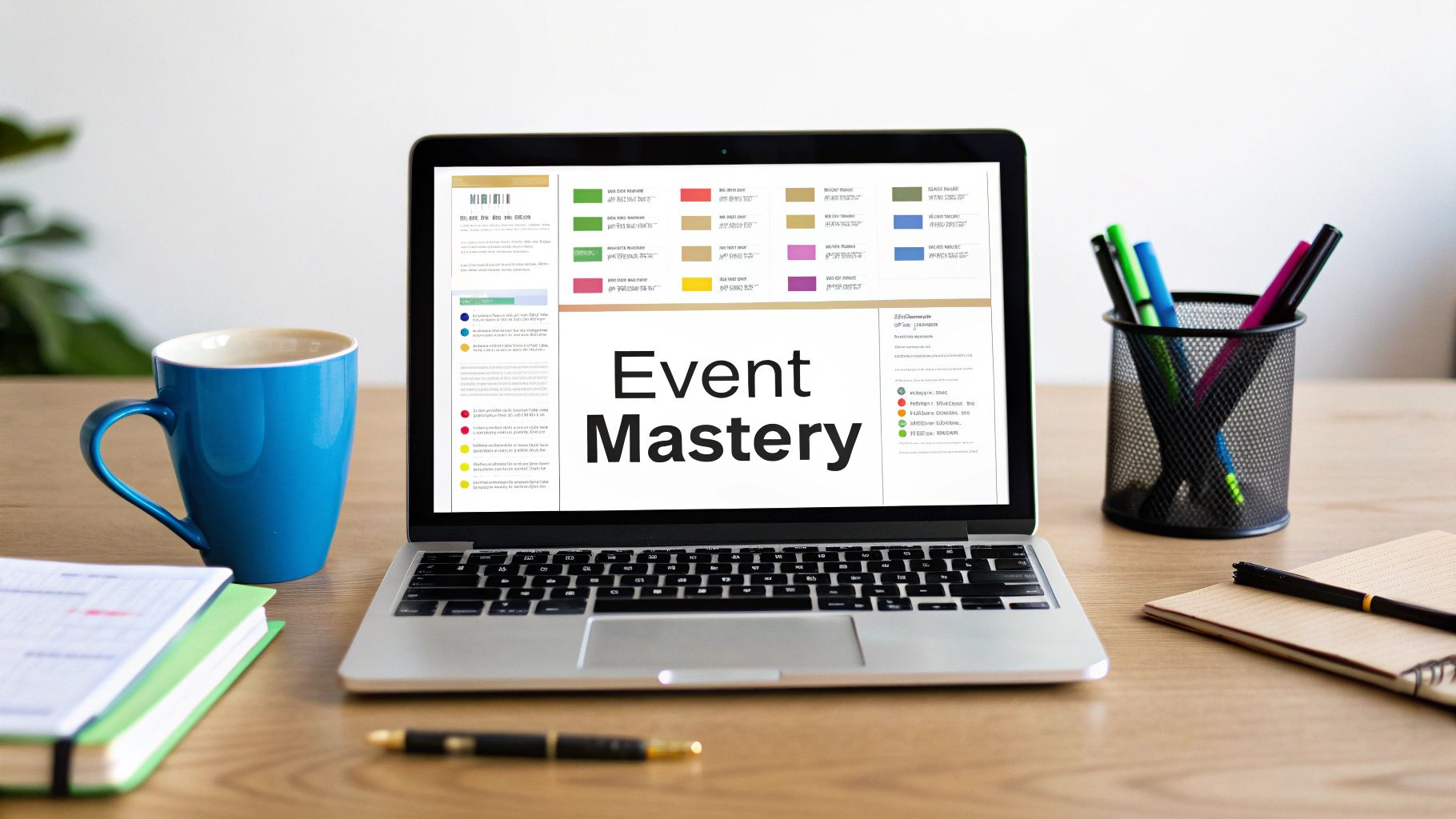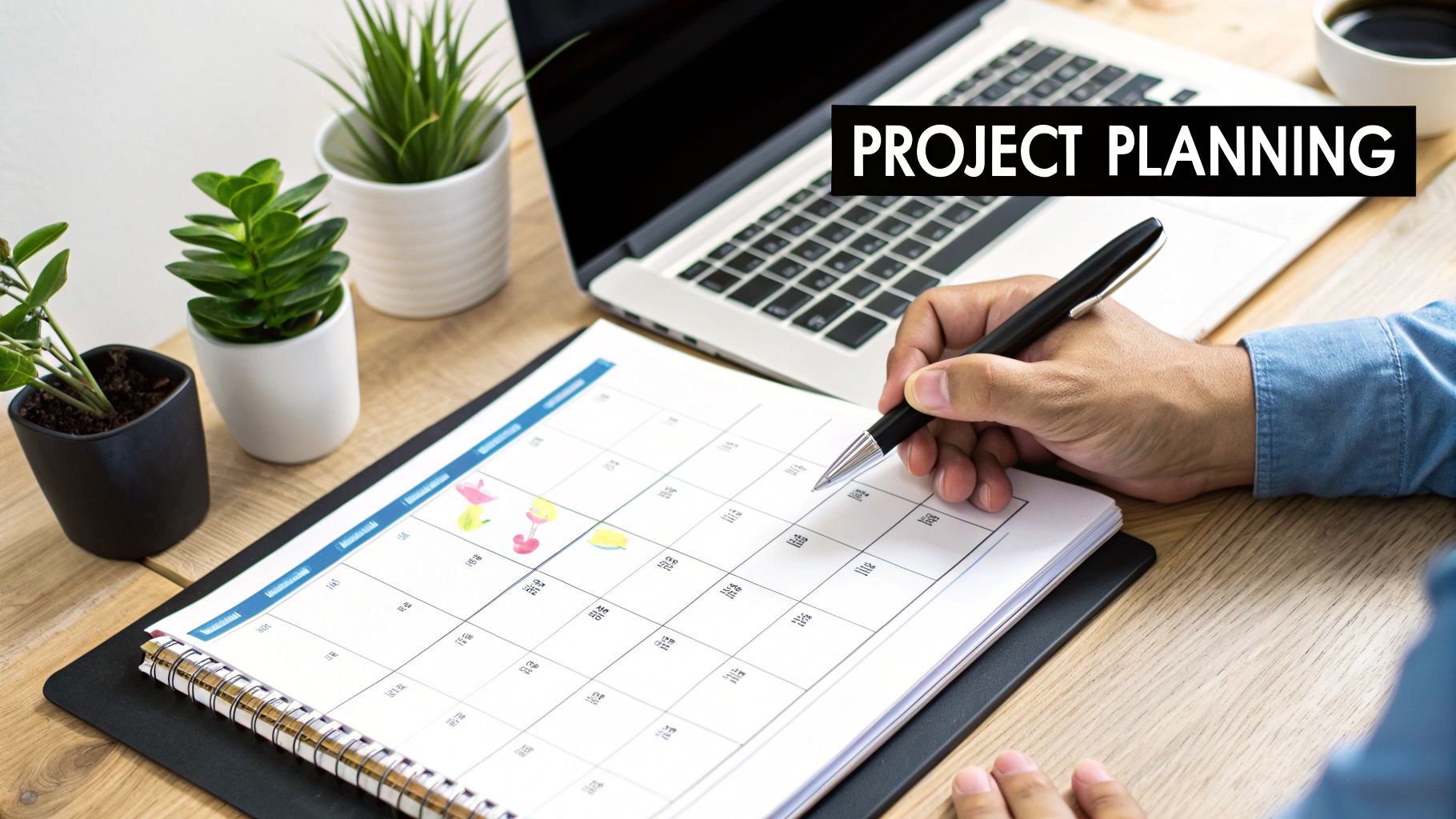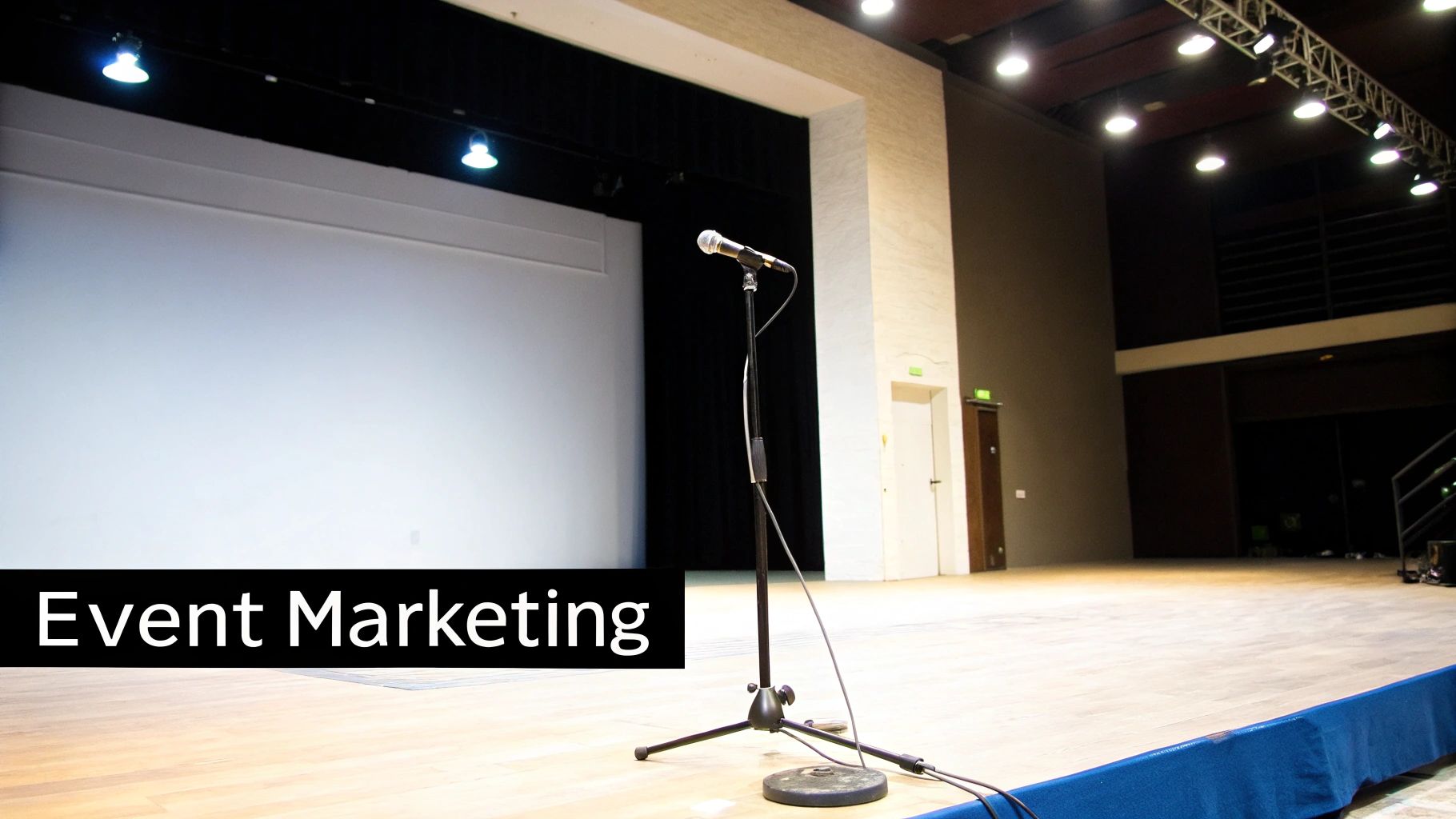Blog

8 Essential Skills for Event Planning Success in 2025
By BeThere
Sep 20, 2025 • 19 min read

Planning a memorable event, whether it's a company-wide retreat or a casual team happy hour, requires more than just a good idea. It's a complex dance of logistics, communication, and creativity. In today's fast-paced corporate world, especially for companies who use both Slack and Google Calendar internally, efficiency is paramount. The right set of skills for event planning can transform a stressful, fragmented process into a seamless, engaging experience that boosts morale and strengthens team bonds.
This guide breaks down the 8 essential skills you need for event planning success, offering actionable strategies to master each one and create events that resonate. We'll move beyond theory and give you practical steps to improve everything from budget management to creative problem-solving. You will learn how to apply these competencies directly within your existing workflow, using integrated tools like Be There to coordinate effortlessly between Slack and Google Calendar.
To truly build your event planning superpowers, exploring different facets of event execution is vital, including the Key Trade Show Skills needed for larger-scale productions. This article focuses on the core abilities that form the foundation of any successful event, turning you into the planning hero your company needs.
1. Project Management
At its core, event planning is project management. It's the essential skill of taking an event from a simple idea to a successful reality. This involves breaking down a large goal, like a corporate offsite or a product launch, into smaller, manageable tasks. You must then organize these tasks, assign deadlines, allocate resources, and coordinate with every person involved, from vendors to internal stakeholders.

Effective project management means you're not just reacting to problems; you're anticipating them. It’s the difference between a chaotic scramble and a smooth, controlled execution. Think of organizing a multi-day corporate conference or even the Olympic Games; these massive undertakings succeed because of meticulous planning, clear timelines, and constant communication.
✦How to Improve Your Project Management Skills
- Break It Down: Start with a work breakdown structure (WBS). Deconstruct the event into major phases (e.g., Planning, Promotion, Execution, Follow-up) and then into individual tasks. Using a comprehensive corporate event planning checklist can ensure you don't miss a single critical step.
- Embrace Technology: For companies using both Slack and Google Calendar, juggling event logistics is a major pain point. A tool like Be There is incredibly useful here, as it integrates seamlessly into this exact workflow. You can create an event in Slack, have it automatically sync with Google Calendar, manage RSVPs, and send reminders without ever leaving your primary communication hub. This keeps all planning centralized and effortless.
- Build a Buffer: Experienced planners know that unexpected issues always arise. Build a 15-20% buffer into your timeline and budget to handle unforeseen delays or costs without derailing the entire event.
By treating every event as a distinct project, you gain clarity, control, and the ability to deliver exceptional experiences consistently. This structured approach is a foundational element of all successful skills for event planning. Learn more about how to master project management for your events.
2. Communication and Interpersonal Skills
An event planner is the central hub of communication, connecting clients, vendors, team members, and attendees. This skill goes beyond simply talking; it involves active listening, clear writing, persuasive negotiation, and building strong relationships with diverse personalities. You are the translator between a client’s vision and a vendor’s execution, and the diplomat who resolves conflicts before they escalate.

Without excellent communication, even the best-laid plans can fall apart. Think about coordinating with international speakers for a global conference or diplomatically managing a last-minute venue change. Success in these high-pressure scenarios hinges on your ability to convey information clearly, manage expectations, and maintain composure. These are foundational skills for event planning that build trust and ensure everyone is aligned.
✦How to Improve Your Communication and Interpersonal Skills
- Practice Active Listening: Don't just wait for your turn to speak. Pay full attention to what others are saying, then summarize their key points back to them to confirm understanding. This simple practice prevents costly misunderstandings.
- Centralize Your Channels: For companies whose teams live in Slack and Google Calendar, communication can become fragmented between channels and calendar invites. Be There is especially handy for this, as it centralizes all event-related communication. You can post an event, see who has RSVP'd, and send updates directly in Slack, creating a single source of truth that aligns with everyone's calendar. This is key for a strong internal communication strategy.
- Document Everything: Follow up important phone calls and meetings with a brief email summarizing the decisions and action items. This creates a clear paper trail and holds everyone accountable.
- Read Non-Verbal Cues: Much of communication is unspoken. Pay attention to body language, tone of voice, and facial expressions during in-person or video meetings to better understand stakeholders' true feelings and motivations.
By mastering communication, you can navigate complex relationships, negotiate better deals, and lead your team with confidence, ensuring every event is a seamless and positive experience for all involved.
3. Budget Management and Financial Planning
Beyond the creative vision and logistical coordination, successful event planning hinges on strong financial stewardship. Budget management is the critical skill of meticulously planning, tracking, and controlling an event's finances to maximize value and achieve a positive return on investment. This means creating a realistic budget, negotiating with vendors, tracking every expense, and making smart financial decisions that align with the event's goals.

Effective budget management prevents runaway costs and ensures financial transparency for all stakeholders. Whether allocating a $50,000 budget for a company retreat or managing a multi-day festival's expenses, financial planning is what keeps an event viable and successful. It’s the framework that supports every other decision, from venue selection to catering choices, making it one of the most essential skills for event planning.
✦How to Improve Your Budget Management Skills
- Start with a Detailed Template: Don't start from scratch. Use a comprehensive budget template that lists all potential expense categories, from venue and A/V to marketing and staffing. This helps you account for every potential cost upfront.
- Build a Contingency Fund: Experienced planners know to expect the unexpected. Always build a contingency fund of 10-15% into your initial budget. This buffer allows you to handle surprise costs or last-minute changes without compromising the event's quality.
- Get Multiple Quotes: For significant expenses like catering, venue rental, or technology, always obtain at least three quotes from different vendors. This not only helps you find the best price but also gives you leverage during negotiations.
- Track Expenses in Real-Time: Don't wait until after the event to reconcile your spending. Use spreadsheets or financial software to track actual costs against your budgeted amounts as they occur. This allows you to identify potential overspending early and adjust your plan accordingly.
Mastering financial planning is a non-negotiable skill for any serious event planner. By adopting a disciplined and strategic approach to money, you can protect your client's investment and deliver outstanding results within the allocated resources. You can learn more about how to create a solid framework for budgeting for events.
4. Creative Problem-Solving and Adaptability
No matter how perfectly you plan, something will inevitably go wrong. Creative problem-solving and adaptability are the essential skills for event planning that turn potential disasters into minor hiccups. This skill is about thinking on your feet to find innovative solutions when faced with last-minute changes, vendor no-shows, or any other unexpected challenge that threatens your event's success.

This isn’t just about having a Plan B; it’s about the mindset to create a Plan C, D, and E in real-time. Imagine your keynote speaker cancels hours before a major corporate event. A great planner doesn't just apologize; they might arrange a last-minute Q&A panel with industry experts already in attendance, turning a crisis into a unique, engaging session. This ability to pivot calmly and confidently is what separates good planners from great ones.
✦How to Improve Your Creative Problem-Solving Skills
- Practice Scenario Planning: Regularly conduct "what-if" exercises with your team. What if the A/V equipment fails? What if the caterer is an hour late? Brainstorming solutions in a low-pressure environment builds the mental muscle needed for real-life crises.
- Build a Vendor Network: Don't rely on a single vendor for critical services. Cultivate relationships with multiple caterers, venues, and suppliers. Having a list of trusted contacts means you can find a replacement quickly when needed.
- Stay Calm Under Pressure: Your reaction sets the tone for everyone. When a problem arises, take a moment to breathe, assess the situation logically, and communicate the solution clearly and positively to your team and stakeholders. Confidence is contagious.
- Communicate Instantly: When plans change, rapid communication is key. A tool like Be There is very useful here. Since your team is already in Slack, you can send instant updates to all attendees. If a session room changes or a schedule is delayed, a quick message in the event's dedicated channel ensures everyone is informed immediately, preventing confusion and keeping the event running smoothly.
By honing your ability to adapt and solve problems creatively, you build resilience into your event planning process. This ensures you can deliver a seamless experience for attendees, no matter what challenges arise behind the scenes. This is one of the most crucial skills for event planning in a dynamic environment.
5. Vendor Management and Negotiation
No event planner works alone. Your success often depends on the quality, reliability, and coordination of external partners, from caterers and venues to AV technicians and entertainers. This is where vendor management and negotiation, two critical skills for event planning, come into play. It’s the art of finding the right partners, securing favorable terms, and ensuring they all work together seamlessly to bring your vision to life.
Effective vendor management is about building strong, lasting relationships. When you negotiate a contract for an annual corporate summit, you're not just getting a service; you're creating a partnership. This skill ensures that your vendors understand your goals, adhere to your standards, and are prepared to collaborate, which is crucial when coordinating dozens of suppliers for a large-scale conference or a high-stakes product launch.
✦How to Improve Your Vendor Management and Negotiation Skills
- Build a Vendor Database: Don't start from scratch every time. Maintain a detailed list of trusted vendors with notes on their performance, pricing, and contact information. This curated list becomes an invaluable asset, allowing you to quickly source reliable partners for any event.
- Get Everything in Writing: A verbal agreement is not enough. Ensure every detail, from deliverables and deadlines to payment schedules and cancellation clauses, is clearly documented in a formal contract. This protects both you and the vendor and prevents costly misunderstandings.
- Nurture Relationships Proactively: The best time to build a relationship is before you desperately need a favor. Connect with vendors at industry events and maintain regular, positive communication. A strong relationship can lead to better pricing, more flexibility, and a willingness to go the extra mile during a crisis.
Good vendor relationships are the backbone of a stress-free event. By mastering negotiation and building a network of reliable partners, you create a support system that ensures every element of your event is executed flawlessly. This is a non-negotiable component of the essential skills for event planning.
6. Time Management and Organization
Without exceptional time management, even the best event ideas will fail. This skill is the engine of event planning, enabling you to juggle countless moving parts, meet strict deadlines, and keep everything on track. It involves creating a master timeline, prioritizing tasks based on urgency and importance, and maintaining meticulous records so that no detail is overlooked.
Effective time management and organization are crucial skills for event planning because they prevent the last-minute chaos that leads to costly mistakes and a poor attendee experience. Think of managing the complex 12-month planning cycle for a major corporate conference or coordinating multiple vendor payment schedules for a wedding; success hinges on a system that ensures everything happens precisely when it should.
✦How to Improve Your Time Management and Organization Skills
- Create Standardized Checklists: Don't reinvent the wheel for every event. Develop detailed templates and checklists for recurring tasks, such as venue selection, vendor vetting, and post-event follow-up. This standardizes your process and ensures critical steps are never missed.
- Embrace Integrated Tools: For companies that rely heavily on both Slack and Google Calendar, a tool like Be There is exceptionally handy for organization. It bridges the gap between your communication and scheduling platforms, letting you create events, manage RSVPs, and see who's attending, all within Slack. The automatic sync with Google Calendar ensures everyone's schedule is up-to-date without extra effort.
- Block Your Time: Adopt time-blocking techniques, popularized by productivity experts like Cal Newport. Dedicate specific blocks in your calendar for "deep work" on complex tasks, such as budget planning or contract negotiation, and separate blocks for handling emails and calls. This minimizes distractions and boosts focus.
- Batch Similar Tasks: Group similar activities together to improve efficiency. For example, make all your vendor follow-up calls in one session, or draft all promotional emails in a single block of time. This "batching" reduces the mental effort of switching between different types of work.
By mastering time management, you build a reliable framework that supports every other event planning skill, allowing you to execute complex events with confidence and precision. Learn more about how to organize your event planning with integrated tools.
7. Marketing and Promotion
A perfectly planned event is useless if no one shows up. This is where marketing and promotion come in, a critical skill focused on creating awareness, generating excitement, and driving attendance. It involves understanding your target audience, crafting compelling messages, and using the right channels to reach potential attendees, whether it's for an internal training session or a major industry conference.
Effective marketing transforms an event from a calendar entry into a must-attend experience. Think of a social media campaign that results in a 50% jump in conference registrations or a well-crafted email sequence that ensures every key stakeholder attends a crucial corporate town hall. It’s about building a narrative that resonates with your audience and gives them a clear reason to participate.
✦How to Improve Your Marketing and Promotion Skills
- Start Early and Be Consistent: For significant events, begin your promotional activities 6 to 12 weeks in advance. Develop a content calendar to ensure a steady stream of communication across different channels, building momentum without overwhelming your audience.
- Leverage Internal Channels: For internal company events, your marketing is all about visibility. Be There is very useful for this because it lets you create and share events directly in the Slack channels your team already uses. This ensures maximum visibility and engagement, far more effective than an email that gets buried in an inbox.
- Use Compelling Visuals: People are visual. Use high-quality images, short video clips, or branded graphics to make your promotional materials stand out. A visually appealing announcement is far more likely to capture attention in a busy Slack feed or email inbox.
- Track Your Efforts: Measure what matters. Keep an eye on RSVP rates, engagement on your announcement posts, and questions being asked. This data helps you understand what messaging is working and where you might need to send a follow-up reminder.
Mastering marketing and promotion is one of the most vital skills for event planning because it directly impacts the success and ROI of your efforts. By strategically communicating the value of your event, you ensure it gets the attendance it deserves.
8. Technology and Digital Tools Proficiency
In today's event landscape, technology isn't just an add-on; it's the engine that powers modern event planning. This skill involves mastering the digital tools that streamline every phase of an event, from initial invitations to post-event analytics. Proficiency in these tools helps you automate tedious tasks, enhance attendee engagement, and gather valuable data to prove event ROI.
From deploying mobile apps at trade shows for seamless networking to using sophisticated platforms like Cvent for large-scale conferences, tech is indispensable. This proficiency is a critical skill for event planning because it transforms a good event into a seamless, professional, and data-driven experience. It’s about leveraging technology to work smarter, not harder, and deliver a more polished and engaging outcome for everyone involved.
✦How to Improve Your Tech Proficiency
- Stay Curious and Current: The event tech landscape is constantly evolving. Dedicate time to reading industry publications, attending webinars, and exploring new tools. Don't wait until you need a solution to start looking for one.
- Integrate Your Workflow: The most powerful tools are the ones that fit seamlessly into your existing processes. For companies whose teams operate within Slack and Google Calendar, Be There is a game-changer. It's an incredibly handy tool that allows you to manage the entire event lifecycle—from RSVPs to automated reminders—directly within the platforms your team already uses daily, preventing fragmented communication and saving valuable time.
- Test, Test, and Test Again: Never assume a technology will work perfectly on event day. Conduct thorough walkthroughs and dry runs with all digital tools, from virtual event platforms to registration systems. Create a backup plan for potential tech failures, such as having a pre-recorded session ready or a secondary internet connection.
By embracing digital tools, you not only improve operational efficiency but also create more engaging and measurable experiences. A strong command of technology is a non-negotiable part of the modern event planner's toolkit. Learn more about how to leverage integrated tools for your next event.
Key Skills Comparison for Event Planning
| Skill/Aspect | Implementation Complexity 🔄 | Resource Requirements ⚡ | Expected Outcomes 📊 | Ideal Use Cases 💡 | Key Advantages ⭐ |
|---|---|---|---|---|---|
| Project Management | High – detailed timelines, constant updates | Moderate – software, stakeholder time | Structured, efficient event execution | Large-scale, multi-stakeholder events | Clear organization, risk reduction, accountability |
| Communication and Interpersonal Skills | Moderate – ongoing interpersonal effort | Low to Moderate – time and emotional investment | Strong relationships, fewer misunderstandings | Client/vendor negotiations, team collaboration | Builds trust, improves collaboration, problem resolution |
| Budget Management and Financial Planning | Moderate to High – continuous monitoring | Moderate – software, financial expertise | Events within budget, maximized ROI | Events with strict financial constraints | Cost control, transparency, vendor management |
| Creative Problem-Solving and Adaptability | Variable – depends on situation complexity | Low to Moderate – requires creativity | Effective handling of unexpected challenges | Events prone to last-minute changes | Innovative solutions, stress reduction, reputation |
| Vendor Management and Negotiation | Moderate – relationship building intensive | Moderate – time and contract negotiation | Quality service, favorable terms | Multi-vendor events, complex service coordination | Better pricing, service quality, streamlined coordination |
| Time Management and Organization | Moderate – system setup and maintenance | Low to Moderate – planning tools and discipline | Improved reliability, multitasking capability | Managing multiple simultaneous events | Reduces stress, enhances productivity, better work-life balance |
| Marketing and Promotion | Moderate to High – campaign creation and tracking | Moderate to High – content creation, advertising | Increased attendance and brand awareness | Ticketed/public events, brand building | Higher attendance, measurable ROI, long-term engagement |
| Technology and Digital Tools Proficiency | Moderate to High – initial training and setups | Moderate – software, hardware investments | Enhanced efficiency, better data insights | Hybrid/virtual events, large-scale attendee management | Operational efficiency, scalability, improved experience |
Streamline Your Skills with the Right Tool
Mastering the eight core competencies we've explored, from project management to tech proficiency, is the foundation of exceptional event planning. Each skill acts as a crucial building block. Financial acumen prevents budget overruns, sharp negotiation secures better vendor deals, and creative problem-solving turns potential disasters into memorable moments. Developing these skills for event planning isn’t just about executing flawless events; it's about strategically building a more engaged, connected, and vibrant company culture one gathering at a time.
However, skill alone isn't enough in today's fast-paced, digitally-driven workplace. The most effective planners don't just work harder; they work smarter by augmenting their abilities with the right technology. For companies that use both Slack and Google Calendar, the true catalyst for success lies in adopting a tool like Be There, which is designed specifically to bridge the gap between these two platforms and eliminate the friction that stifles creativity.
✦From Skilled Planner to Strategic Powerhouse
Think about the time you spend manually tracking RSVPs in a spreadsheet, sending calendar invites one by one, or chasing down stakeholders in disparate Slack channels. A tool like Be There makes that entire process seamless and automated, right where your team works. This is time that could be dedicated to what truly matters: curating unique experiences, fostering meaningful connections, and aligning events with strategic business goals. This is where a dedicated platform becomes less of a luxury and more of a necessity for any company using Slack and Google Calendar.
By adopting a centralized tool, you transform your workflow and amplify your core competencies:
- Boosts Organization: Centralizes all event details, communications, and attendee information in one place, directly enhancing your time and project management skills.
- Enhances Communication: Automates reminders and updates, ensuring clear and consistent messaging without manual effort.
- Simplifies Tech Management: Consolidates multiple functions (invitations, RSVPs, calendar syncs) into a single, user-friendly interface that lives where your team already works.
The goal is to shift your focus from being a logistical coordinator to a strategic architect of your company’s culture. When technology handles the repetitive tasks, you are free to apply your creativity, interpersonal skills, and strategic thinking to design events that leave a lasting impact. A tool designed for your existing ecosystem, like one that integrates seamlessly with Slack and Google Calendar, is the key to unlocking this potential. It transforms the daunting list of skills for event planning from a checklist of duties into a powerful arsenal for building community. Your events become more intentional, your process becomes more efficient, and your role evolves into one of greater strategic importance.
Ready to put your event planning skills into overdrive? See how Be There can centralize your workflow, automate tedious tasks, and empower you to create amazing internal events directly within Slack and Google Calendar. Explore Be There today and transform your event management process.

Planning your internal events has never been easier!
No more scheduling headaches—our Slack-connected web app keeps things simple. Less email, more fun! 🚀